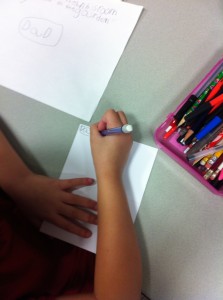Practicing Gratitude by Rochelle Melander
 If you want to find happiness, find gratitude. —Steve Maraboli
If you want to find happiness, find gratitude. —Steve Maraboli
This past month I’ve spent three afternoons at two city libraries teaching children to write gratitude letters. We’ve used lots of paper as we’ve mind-mapped gratitude. Between all three sessions, the children have written almost 50 thank you cards. It’s such great fun to watch the children’s faces brighten as they imagine how happy their teachers, parents, or grandparents will be when they open their card. Though one young boy—a third grader—did point out how risky this operation could be. It seems that his mom had a tendency to kiss and hug him when he did something sweet, and he didn’t want any of that. As we talked about who he could thank, he slowly inched away from the table, arms up in protest, until we were able to find a neutral party who would not be likely to show outward signs of affection. And even he left the event with a big smile on his face.
There’s a good reason for that smile: saying thank you can make you happier. A few years ago, I read the book Thanks: How the New Science of Gratitude Can Make You Happier by Robert A. Emmons. Professor Emmons and his colleague Professor Mike McCullough have conducted many gratitude studies. The first looked at the effects of gratitude journaling. All of the participants kept a journal and were asked to write a sentence a week for ten weeks. The first group described five things they were grateful for. The second group described five hassles. The neutral group simply listed five things that had affected them in the past week. After ten weeks, the gratitude group was 25% happier than the other participants. In addition, the gratitude group:
*felt better about their lives
*were more optimistic about the future
*reported fewer health complaints
*spent more time exercising (1.5 hours more per week)
(Emmons, p. 30)
With the American Thanksgiving coming up this week (eek! I still need to rescue the dining room table from my stacks of books and unopened mail), it seems like the perfect time to try out the science of being grateful. Here’s how to use writing and art to practice gratitude:
*Mind Map Gratitude. Using a mind map, writers can visually diagram ideas and information. Draw a circle in the center of a large blank sheet of paper and record your central theme. For this exercise, you’d write gratitude. Then draw spokes out from the center and add more circles. These circles might contain gratitude categories like family, friends, and creature comforts. From there, add more lines and write down the specific people and items you are thankful for. Use lots of markers, crayons, or colored pencils to make your mind map vibrant and fun.
*Collage Gratitude. Cut out or find photos, images, and found objects that represent what you are grateful for. Assemble them into a collage and glue! If you don’t like playing with glue, pin items onto a bulletin board or stack them on a special gratitude shelf.
*Write it down! Once you’ve finished your gratitude mind map or collage, take your ideas and shape them into:
+A Gratitude Haiku.
+Thank you cards.
+A Field Guide to Gratitude.
Your turn: How have you used writing and art to express gratitude? Comment below.









I was inspired by author Jackie Kelm at http://www.appreciativeliving.com to write responses to the following prompts every day:
Three things I am grateful for:
What one thing could I do today, no matter how small, that would increase my joy?
So far I’ve been writing these things almost daily since September 11, 2012. I write them first thing every morning. I set a daily “alarm” on my computer to remind me. This practice has increased my awareness of what I’m grateful for, and has also prompted me to be grateful for some things that I didn’t like at first. I recommend it! It’s fun to go back and read former entries.
I love these prompts. Thank you!
I appreciate your comments on gratitude. Cicero got it right when he said ‘gratitude is the parent of all virtues’. It works at all ages. As an adult I try to remember the individuals that have helped me along the way. Recalling what it was about them that made a difference reminds me of the kind of person I want to be. I’ve also noted in those I work with that gratitude brings humility. And humility is a wonderful antidote to any tendency toward over-confidence and arrogance.
I love that quote. And I like your thoughts on gratitude and humility! Lots to ponder.